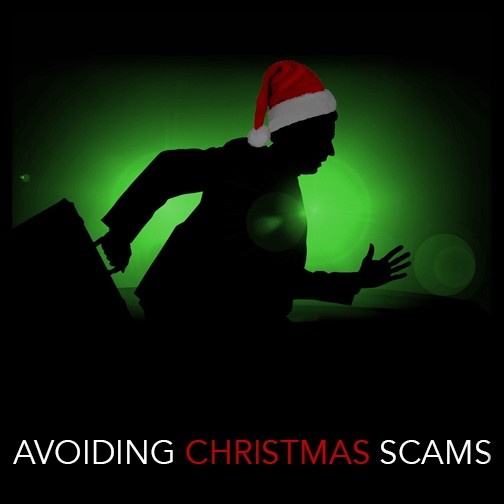How to Avoid Getting Scammed This Christmas
As some of you will know, and hopefully more of you will come to learn as we get closer to this year’s festivities, Christmas isn’t only a season of love, sharing and giving, but it’s also the hottest time of year for scams.
With that in mind, I’d like to let you in on a few hints and tips so that you can avoid getting conned this Christmas, and hopefully save a few bucks so that you can enjoy your time with friends and family all the more!
So, let’s first take a look at the three main ways that people get scammed over Christmas, then we’ll look at how to avoid each respectively:
Types of Scams:
Online:
Unfortunately, there are a multitude of ways that you can get scammed online, especially leading up to Christmas. Fake websites that look just like the real thing will be cropping up, fraudulent ads and pop ups will try to lure you in to part with your cash, potential dates or love interests may start pressing you for money (or more if they already have) and you’re bound to encounter a huge range of fake posts across Social Media and classified sites, such as Gumtree and eBay;
Social Media:
As we get closer to Christmas, people will be flogging off some of their stuff to make extra cash for pressies, but don’t be fooled by all the lovely things you see for sale. When engaging in any purchases over Facebook, Twitter, Instagram, Google Plus and any of the others, it’s important to remember that the channel you’re dealing with holds no responsibility for your purchase. That means that if you get ripped off, they won’t help you.
Classifieds Sites (E.g. Gumtree & Ebay):
Classifieds sites are a great way for people to sell on their used or unwanted items, but you’ll also find a host of businesses advertising their products there too.
Beware of fake advertisements for products that either don’t exist, aren’t with the person advertising them for sale or aren’t as advertised. By extension, be careful about ads selling goods that seem to good to be true, for example an iPhone 6s for $150 just doesn’t make sense unless the phone’s faulty, damaged or fake.
Online Dating:
Romance scammers are experts when it comes to playing on emotion and, with that, it’s very unlikely you’d know you were talking to one until it was too late.
Romance scams are a continuing problem across the world, but Australians tend to be particularly good at falling for the fake feelings, with over $21,000,000 (yes, $21 MILLION) dollars having been stolen, across roughly 3,500 cases so far this year.
Asking for money is often a sensitive and incredibly personal thing to do, not just for the person being asked, but for the person asking as well. Please keep that in mind if you ever find the person you’re interested in online asking for “help” or “support.”
If you’ve recently met someone online, but you’ve never spoken to them in real life or even over Skype or something similar, and you’re really hitting things off… you’ve shared intimate memories; you’ve worked on future plans together; you’ve discussed having children or; you’ve simply engaged in something sexual… don’t let your heart cloud your judgment if that person asks you for money one day.
Christmas is a financially stressful time for a lot of people, and it makes sense that you might like to give away a few dollars to the people in your life that matter, or need it most… but I implore you to avoid giving it away to people you’ve never met. Statistically speaking, it is very likely that someone asking for money from someone they’ve only met online is very likely to result in a serious case of fraud.
Search your emotions and consider an alternative, such as inviting that person to come and spend Christmas with you instead, or visiting them and their families? Alternatively, you can even suggest you purchase the gift on your own and ship it to the address of their choice… and you could play around there to find out how genuine the person really is.
Fake Websites:
Believe it or not, there are a few people out there who make their living by cloning websites and forcing them in place of the real ones, going so far as to take payments for sales and never delivering the goods. The customer, in the meantime, will have had no idea that anything went wrong, only realising a few days later after their package was due, that nothing had arrived. Calls to customer service don’t work because the order number and tracking information you may have received by email (some fake websites go this far) are fake. Unfortunately, if they have your email address, it’s also likely that they will sell that information on to other third parties and malicious groups.
How to Avoid them:
If you’re shopping at the bigger stores or businesses, look for the secure certificate! In the web address (URL) bar at the top of your browser, have a look for either a little padlock or the letters, “https.” If you see the padlock but it’s open or crossed out, or you see the letters “http,” without the S, then the site you’re visiting has not invested in proper internet security and is therefore unlikely to be the one you had in mind.
Look at the quality of the images, logo and general design of the site. If the pictures are grainy, pixelated or just look a bit wrong, then it’s likely a fake site as the information they used to create it would simply have been taken from low resolution screenshots or the real site.
Check out their contact details and do a separate google search of the information you find. If the details are correct and correspond to the right company, then you could proceed (albeit still with caution), but if they are completely wrong then ditch it immediately.
If it’s a company you don’t really know, do a cross-check with their Facebook page or other social channels. This is also a good tip in general for any major purchases as checking the relevant social channels will also reveal whether other customers have faced issues with recent orders.
Check the reviews and, failing all else, there’s always the trusty Scam Adviser, which you can visit by clicking this link.
By Phone:
Phone scams are generally quite successful across Australia throughout the year, and at this particular time, scammers are more likely to press home on the more personal issues that could affect your Christmas.
The best tip to stay ahead of these morons is simply to ask for the person’s name and contact information and then call them back. Google the company and contact information and call the number listed there and ask for the details on the matter of your previous call.
By Email:
As with the phone calls, scammers are going to be tapping into the Christmas spirit. There is one scam in particular that seems to crop up a lot around this time and this is the infamous parcel delivery scam.
The scam is simple: a fake delivery company sends you an email informing you of an issue with a recent delivery. They are gambling on the fact that you ordered something online, or may be sophisticated enough to have traced your computer’s activity to ensure that you did. In the latter case, it’s quite likely the delivery company will have more details about your order.
When you open the email, you will see some generic information about what happened to your package, say for example, they tried to deliver the package but you weren’t home.
You will then be provided a link to see more information or book another delivery. That link, in itself, can be dangerous in the fact that sometimes parcel delivery scammers use the trick to install spyware onto your computer – a type of virus that reads and transmits all the information you type in or view on your PC. Alternatively, the link will take you to a page that explains that a small fee needs to be paid in order to have the package redelivered, or to remedy whatever problems caused the “inconvenience.” Beware at this point, if you type in your card details, you’ll likely pay for nothing and possibly even end up paying a heck of a lot more than you thought you would.
Also, I suspect we’ll be hearing more from our friends overseas who have come into great personal wealth and are looking to immigrate to Australia. As a Christmas gift, of course, they thought it would be nice to offer you 10-20% of their wealth as payment for helping them to secure the funds here. How? Through your bank account.
That’s about all there is for now, but if you’d like to know more about scams cropping up around Christmas, have a read of our other article, the 12 Scams of Christmas.
Don’t fall for them and please, if you do find any along the way, please report them or at least bring other people’s attention to any potentially fraudulent or harmful websites, emails or phone calls.

























